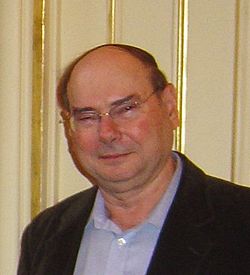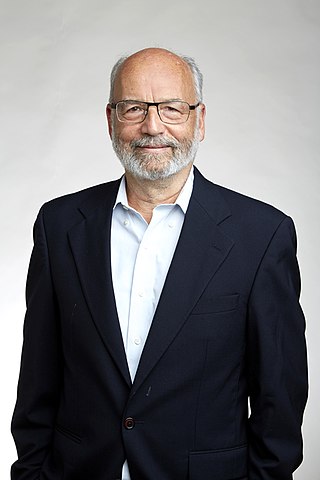
Adi Shamir is an Israeli cryptographer and inventor. He is a co-inventor of the Rivest–Shamir–Adleman (RSA) algorithm, a co-inventor of the Feige–Fiat–Shamir identification scheme, one of the inventors of differential cryptanalysis and has made numerous contributions to the fields of cryptography and computer science.
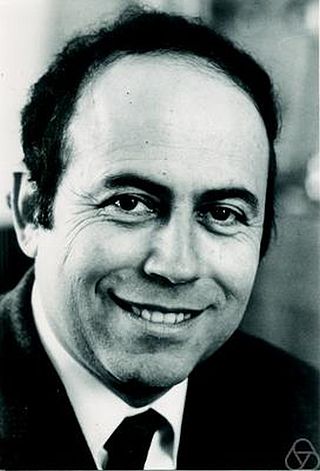
Michael Oser Rabin is an Israeli mathematician, computer scientist, and recipient of the Turing Award.

The Weizmann Institute of Science is a public research university in Rehovot, Israel, established in 1934, fourteen years before the State of Israel was founded. Unlike other Israeli universities it exclusively offers postgraduate-only degrees in the natural and exact sciences.
Zohar Manna was an Israeli-American computer scientist who was a professor of computer science at Stanford University.

Judea Pearl is an Israeli-American computer scientist and philosopher, best known for championing the probabilistic approach to artificial intelligence and the development of Bayesian networks. He is also credited for developing a theory of causal and counterfactual inference based on structural models. In 2011, the Association for Computing Machinery (ACM) awarded Pearl with the Turing Award, the highest distinction in computer science, "for fundamental contributions to artificial intelligence through the development of a calculus for probabilistic and causal reasoning". He is the author of several books, including the technical Causality: Models, Reasoning and Inference, and The Book of Why, a book on causality aimed at the general public.
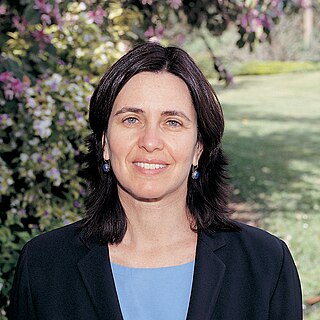
Shafrira Goldwasser is an Israeli-American computer scientist. A winner of the Turing Award in 2012, she is the RSA Professor of Electrical Engineering and Computer Science at the Massachusetts Institute of Technology; a professor of mathematical sciences at the Weizmann Institute of Science; the director of the Simons Institute for the Theory of Computing at the University of California, Berkeley; and co-founder and chief scientist of Duality Technologies.
The Courant Institute of Mathematical Sciences is the mathematics research school of New York University (NYU). Founded in 1935, it is named after Richard Courant, one of the founders of the Courant Institute and also a mathematics professor at New York University from 1936 to 1972, and serves as a center for research and advanced training in computer science and mathematics. It is located on Gould Plaza next to the Stern School of Business and the economics department of the College of Arts and Science.
Dov M. Gabbay is an Israeli logician. He is Augustus De Morgan Professor Emeritus of Logic at the Group of Logic, Language and Computation, Department of Computer Science, King's College London.
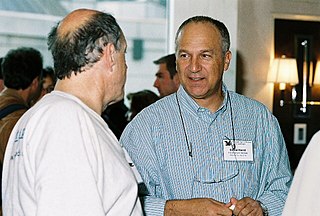
David Harel is a computer scientist, currently serving as President of the Israel Academy of Sciences and Humanities. He has been on the faculty of the Weizmann Institute of Science in Israel since 1980, and holds the William Sussman Professorial Chair of Mathematics. Born in London, England, he was Dean of the Faculty of Mathematics and Computer Science at the institute for seven years.

Avi Wigderson is an Israeli computer scientist and mathematician. He is the Herbert H. Maass Professor in the school of mathematics at the Institute for Advanced Study in Princeton, New Jersey, United States of America. His research interests include complexity theory, parallel algorithms, graph theory, cryptography, and distributed computing. Wigderson received the Abel Prize in 2021 for his work in theoretical computer science. He also received the 2023 Turing Award for his contributions to the understanding of randomness in the theory of computation.
Omer Reingold is an Israeli computer scientist. He is the Rajeev Motwani professor of Computer Science in the Computer Science Department at Stanford University and the director of the Simons Collaboration on the Theory of Algorithmic Fairness. He received a PhD in computer science at Weizmann in 1998 under Moni Naor. He received the 2005 Grace Murray Hopper Award for his work in finding a deterministic logarithmic-space algorithm for st-connectivity in undirected graphs. He, along with Avi Wigderson and Salil Vadhan, won the Gödel Prize (2009) for their work on the zig-zag product. He became a Fellow of the Association for Computing Machinery in 2014 "For contributions to the study of pseudorandomness, derandomization, and cryptography."

Moshe Ya'akov Vardi is an Israeli theoretical computer scientist. He is the Karen Ostrum George Distinguished Service Professor in Computational Engineering at Rice University, United States. and a faculty advisor for the Ken Kennedy Institute. His interests focus on applications of logic to computer science, including database theory, finite model theory, knowledge of multi-agent systems, computer-aided verification and reasoning, and teaching logic across the curriculum. He is an expert in model checking, constraint satisfaction and database theory, common knowledge (logic), and theoretical computer science.
The W. Wallace McDowell Award is awarded by the IEEE Computer Society for outstanding theoretical, design, educational, practical, or related innovative contributions that fall within the scope of Computer Society interest. This is the highest technical award made solely by the IEEE Computer Society where selection of the awardee is based on the "highest level of technical accomplishment and achievement". The IEEE Computer Society is "dedicated to advancing the theory, practice, and application of computer and information processing technology." Another award considered to be the "most prestigious technical award in computing" is the A. M. Turing Award awarded by Association for Computing Machinery (ACM). This is popularly referred to as the "computer science's equivalent of the Nobel Prize". The W. Wallace McDowell Award is sometimes popularly referred to as the "IT Nobel".

Micha Sharir is an Israeli mathematician and computer scientist. He is a professor at Tel Aviv University, notable for his contributions to computational geometry and combinatorial geometry, having authored hundreds of papers.

Irit Dinur is an Israeli computer scientist. She is professor of computer science at the Weizmann Institute of Science. In 2024 she was appointed a permanent faculty member in the School of Mathematics of the Institute for Advanced Study. Her research is in foundations of computer science and in combinatorics, and especially in probabilistically checkable proofs and hardness of approximation.
Nissim Francez is an Israeli professor, emeritus in the computer science faculty at the Technion, and former head of computational linguistics laboratory in the faculty.
Tal Geula Malkin is an Israeli-American cryptographer who works as a professor of computer science at Columbia University, where she heads the Cryptography Lab and the Data Science Institute Cybersecurity Center.
Dana Fisman is an Israeli computer scientist whose research has included work on the reconstruction of automaton-based models in computational learning theory including induction of regular languages, on temporal logic and the Property Specification Language, and on program synthesis. She is an associate professor of computer science at Ben-Gurion University of the Negev.
Lenore D. Zuck is an Israeli-American computer scientist whose research involves formal methods in software engineering, as well as information privacy. She is a research professor of computer science at the University of Illinois Chicago.
